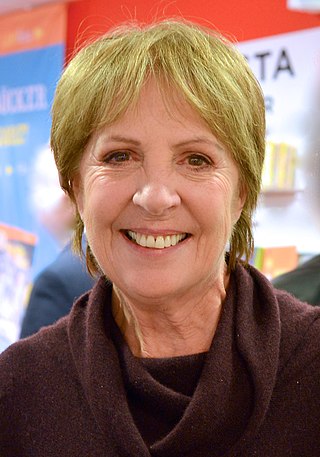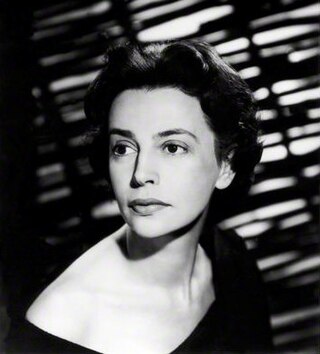
Richard David Briers was an English actor whose five-decade career encompassed film, radio, stage and television.

Felicity Ann Kendal is an English actress, working principally in television and theatre. She has appeared in numerous stage and screen roles over a more than 70-year career, including as Barbara Good in the 1975 television series The Good Life. Kendal was born in Olton, England, and moved to India with her family from the age of seven. Her father was an English actor-manager who led his own repertory company on tours of India, and Kendal appeared in roles for the company both before and after leaving England. She appeared in the film Shakespeare Wallah (1965) which was inspired by her family.

Dame Penelope Alice Wilton is an English actress.

Dame Agnes Sybil Thorndike, Lady Casson, was an English actress whose stage career lasted from 1904 to 1969.
Claire Skinner is an English actress, known in the United Kingdom for her television career, particularly playing Sue Brockman from the BBC television series Outnumbered. She is also known for her collaboration with director Mike Leigh on two of his films, Life is Sweet (1990) and Naked (1993).

Georgina Hale was a British actress. In a career spanning six decades, her credits include work in radio, stage, film, and television. She was the recipient of such accolades as a British Academy Film Award, in addition to a nomination for a Laurence Olivier Award. In 2010, she was listed as one of ten great British character actors by The Guardian.

Joyce Carey, OBE was an English actress, best known for her long professional and personal relationship with Noël Coward. Her stage career lasted from 1916 until 1987, and she was performing on television in her 90s. Although never a star, she was a familiar face both on stage and screen. In addition to light comedy, she had a large repertory of Shakespearean roles.

Adrienne Corri was a Scottish actress.

Dulcie Winifred Catherine Savage Denison,, known professionally as Dulcie Gray, was a British actress, mystery writer and lepidopterist.

John Michael Terence Wellesley Denison was an English actor. He often appeared with his wife, Dulcie Gray, with whom he featured in several films and more than 100 West End theatre productions.

The Lyric Theatre is a West End theatre in Shaftesbury Avenue in the City of Westminster. It was built for the producer Henry Leslie, who financed it from the profits of the light opera hit, Dorothy, which he transferred from its original venue to open the new theatre on 17 December 1888.
Relatively Speaking is a 1965 play by British playwright Alan Ayckbourn, originally titled Meet My Father, his first major success.

Gwendoline Watford, professionally known after the mid-1950s as Gwen Watford, was an English actress.

Sparrows Can't Sing is a 1963 British kitchen sink comedy, the only film that Joan Littlewood directed. It starred James Booth and Barbara Windsor. It was written by Stephen Lewis based on his 1960 play Sparrers Can't Sing, first performed at Littlewood's Theatre Workshop in the Theatre Royal Stratford East. The producer was Donald Taylor.

A Chorus of Disapproval is a 1989 British film adapted from the 1984 Alan Ayckbourn play of the same title, directed by Michael Winner. Among the films's cast are Anthony Hopkins, Jeremy Irons, Richard Briers, and Alexandra Pigg.
Janie Dee is a British actress. She won the Olivier Award for Best Actress, Evening Standard Award and Critics' Circle Theatre Award for Best Actress in a Play, and in New York the Obie and Theatre World Award for Best Newcomer, for her performance as Jacie Triplethree in Alan Ayckbourn's Comic Potential.

Judy Campbell was an English film, television and stage actress, widely known to be Noël Coward's muse. Her daughter was the actress and singer Jane Birkin, her son the screenwriter and director Andrew Birkin, and among her grandchildren are the actresses Charlotte Gainsbourg and Lou Doillon, the late poet Anno Birkin, the artist David Birkin and the late photographer Kate Barry.
Lia Williams is an English actress and director, on stage, in film and television. She has had television roles in The Crown, in May 33rd (2004) for which she was nominated for a BAFTA, and in The Missing (2016), Kiri (2016), His Dark Materials (2019–2022) and The Capture (2019–2021).

The Vortex is a play in three acts by the English writer and actor Noël Coward. The play depicts the sexual vanity of a rich, ageing beauty, her troubled relationship with her adult son, and drug abuse in British society circles after the First World War. The son's cocaine habit is seen by many critics as a metaphor for homosexuality, then taboo in Britain. Despite, or because of, its scandalous content for the time, the play was Coward's first great commercial success.

Margaret Johnston was an Australian actress. Johnston was best known for her stage performances, but also appeared in 12 films and a handful of TV productions before retiring from acting in 1968 to devote herself to running a theatrical agency.














